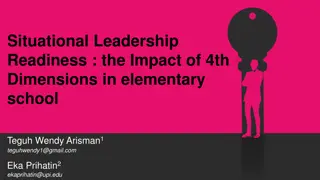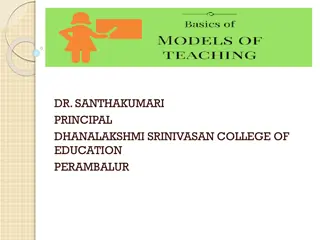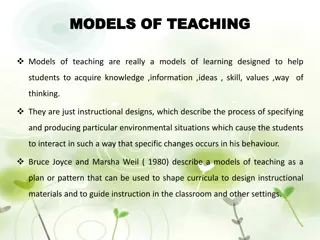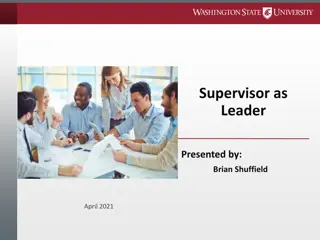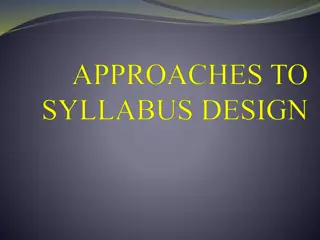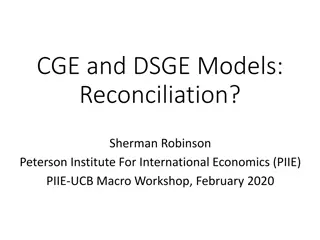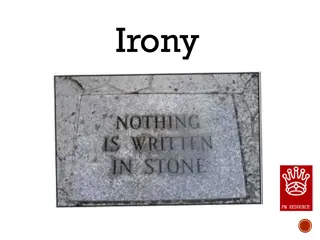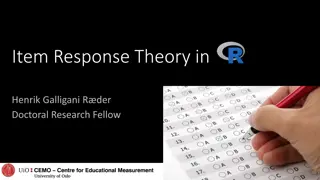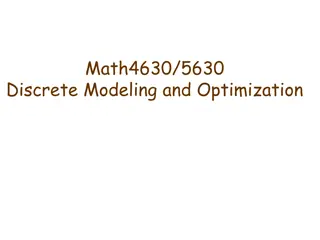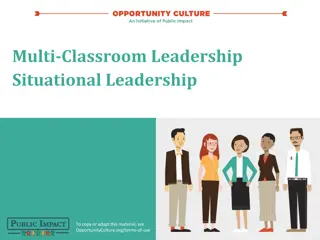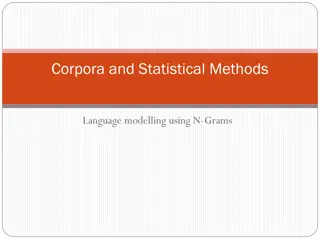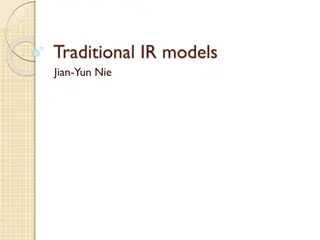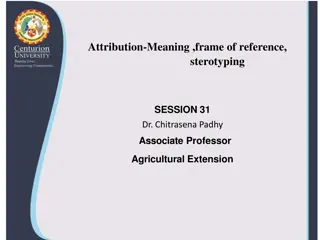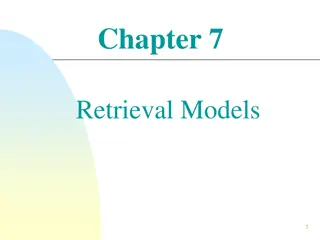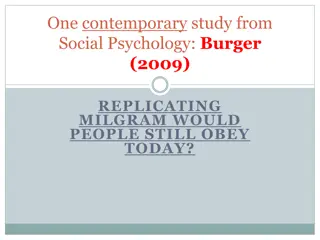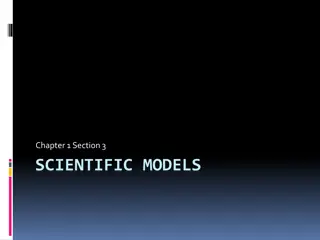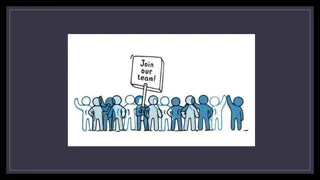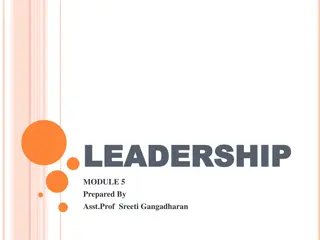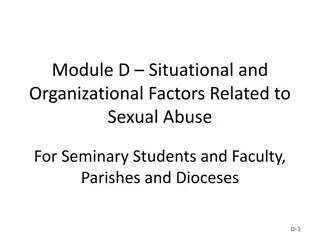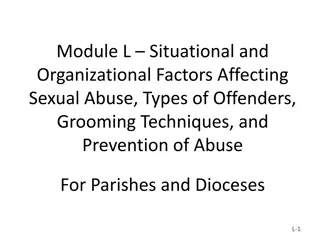Global Climate Models
Scientists simulate the climate system and project future scenarios by observing, measuring, and applying knowledge to computer models. These models represent Earth's surface and atmosphere using mathematical equations, which are converted to computer code. Supercomputers solve these equations to pr
3 views • 15 slides
System Models in Software Engineering: A Comprehensive Overview
System models play a crucial role in software engineering, aiding in understanding system functionality and communicating with customers. They include context models, behavioural models, data models, object models, and more, each offering unique perspectives on the system. Different types of system
3 views • 33 slides
Understanding Input-Output Models in Economics
Input-Output models, pioneered by Wassily Leontief, depict inter-industry relationships within an economy. These models analyze the dependencies between different sectors and have been utilized for studying agricultural production distribution, economic development planning, and impact analysis of i
8 views • 7 slides
Impact of Situational Leadership Readiness in Elementary School
The study explores how situational leadership styles, specifically in the dimensions of Selling, Telling, Participating, and Delegating, impact elementary school leadership. Research conducted at an elementary school in Ciniru, Kuningan, relied on qualitative methods including observation, interview
1 views • 10 slides
Understanding Models of Teaching in Education
Exploring different models of teaching, such as Carroll's model, Proctor's model, and others, that guide educational activities and environments. These models specify learning outcomes, environmental conditions, performance criteria, and more to shape effective teaching practices. Functions of teach
2 views • 20 slides
Understanding Models of Teaching for Effective Learning
Models of teaching serve as instructional designs to facilitate students in acquiring knowledge, skills, and values by creating specific learning environments. Bruce Joyce and Marsha Weil classified teaching models into four families: Information Processing Models, Personal Models, Social Interactio
1 views • 28 slides
Understanding Leadership Styles and Models
Leadership encompasses influencing positive change through collaborative relationships. Different leadership styles and models exist, focusing on tasks, people, or situations. Blanchard's Situational Leadership Model emphasizes flexibility, diagnosis, and communication skills. Effective leaders adap
1 views • 37 slides
Understanding Language Teaching Syllabus: Integration, Theory, and Approaches
Language Teaching Syllabus involves the integration of subject matter and linguistic elements, guided by theories of language and learning. Various approaches like Grammatical, Situational, Communicative, and Analytic are used to structure syllabi. Breaking language into parts aids in sequential lea
1 views • 28 slides
Significance of Models in Agricultural Geography
Models play a crucial role in various disciplines, including agricultural geography, by offering a simplified and hypothetical representation of complex phenomena. When used correctly, models help in understanding reality and empirical investigations, but misuse can lead to dangerous outcomes. Longm
0 views • 8 slides
Understanding CGE and DSGE Models: A Comparative Analysis
Explore the similarities between Computable General Equilibrium (CGE) models and Dynamic Stochastic General Equilibrium (DSGE) models, their equilibrium concepts, and the use of descriptive equilibria in empirical modeling. Learn how CGE and DSGE models simulate the operation of commodity and factor
4 views • 15 slides
Understanding Irony in Verbal, Dramatic, and Situational Contexts
Explore the nuances of verbal, dramatic, and situational irony through examples and explanations. Verbal irony involves saying something different from what is meant, often using humor like puns. Dramatic irony occurs when the audience knows something the characters don't, creating suspense. Situati
0 views • 12 slides
Enhancing Information Retrieval with Augmented Generation Models
Augmented generation models, such as REALM and RAG, integrate retrieval and generation tasks to improve information retrieval processes. These models leverage background knowledge and language models to enhance recall and candidate generation. REALM focuses on concatenation and retrieval operations,
1 views • 9 slides
Understanding Item Response Theory in Measurement Models
Item Response Theory (IRT) is a statistical measurement model used to describe the relationship between responses on a given item and the underlying trait being measured. It allows for indirectly measuring unobservable variables using indicators and provides advantages such as independent ability es
2 views • 32 slides
Understanding Hospital Bed Turnover and Situational Leadership Characteristics
Hospital bed turnover is crucial for assessing hospital productivity, with turnover interval (TOI) indicating the average period a bed remains empty. Bed turnover rate (BTR) measures patient care efficiency. Situational leadership, adaptable to group needs, involves directing and coaching based on g
2 views • 7 slides
Understanding Discrete Optimization in Mathematical Modeling
Discrete Optimization is a field of applied mathematics that uses techniques from combinatorics, graph theory, linear programming, and algorithms to solve optimization problems over discrete structures. This involves creating mathematical models, defining objective functions, decision variables, and
0 views • 12 slides
Exploring Situational Leadership and Mindset in Educational Leadership
This educational session delves into Situational Leadership, utilizing the Hersey-Blanchard framework, to tailor leadership approaches based on the mindset, skill, and will of educators. It also discusses growth versus fixed mindsets and includes a practical mindset vignette for application. Partici
0 views • 13 slides
Enhancing Defensive Skills and Situational Awareness in Hockey
Enhancing defensive skills and situational play in hockey is crucial for success. All team members can contribute to team defense by developing skills like skating, body checking, understanding the ice surface defensively, read and react abilities, and effective communication. Proper skating skills
3 views • 45 slides
Observational Constraints on Viable f(R) Gravity Models Analysis
Investigating f(R) gravity models by extending the Einstein-Hilbert action with an arbitrary function f(R). Conditions for viable models include positive gravitational constants, stable cosmological perturbations, asymptotic behavior towards the ΛCDM model, stability of late-time de Sitter point, a
1 views • 12 slides
Understanding Wireless Propagation Models: Challenges and Applications
Wireless propagation models play a crucial role in characterizing the wireless channel and understanding how signals are affected by environmental conditions. This article explores the different propagation mechanisms like reflection, diffraction, and scattering, along with the challenges and applic
1 views • 14 slides
Models for On-line Control of Polymerization Processes: A Thesis Presentation
This presentation delves into developing models for on-line control of polymerization processes, focusing on reactors for similar systems. The work aims to extend existing knowledge on semi-batch emulsion copolymerization models, with a goal of formulating models for tubular reactors. Strategies, ba
0 views • 16 slides
Understanding N-Gram Models in Language Modelling
N-gram models play a crucial role in language modelling by predicting the next word in a sequence based on the probability of previous words. This technology is used in various applications such as word prediction, speech recognition, and spelling correction. By analyzing history and probabilities,
0 views • 101 slides
Understanding Irony: Verbal, Dramatic, and Situational Examples
Dive into the world of irony with examples of verbal, dramatic, and situational irony explained through scenarios like sarcastic comments, horror movie twists, and unexpected encounters. Explore how irony adds layers of meaning and depth to storytelling, from characters knowing more than others to o
0 views • 10 slides
Understanding Information Retrieval Models and Processes
Delve into the world of information retrieval models with a focus on traditional approaches, main processes like indexing and retrieval, cases of one-term and multi-term queries, and the evolution of IR models from boolean to probabilistic and vector space models. Explore the concept of IR models, r
0 views • 65 slides
Understanding Cross-Classified Models in Multilevel Modelling
Cross-classified models in multilevel modelling involve non-hierarchical data structures where entities are classified within multiple categories. These models extend traditional nested multilevel models by accounting for complex relationships among data levels. Professor William Browne from the Uni
0 views • 13 slides
Understanding Attribution Theory: Exploring Dispositional vs. Situational Attribution
Attribution theory examines how people explain behavior and events by analyzing internal vs. external causes. Heider's influential ideas on dispositional vs. situational attributions are discussed. Dispositional attribution focuses on internal characteristics, while situational attribution relates b
0 views • 14 slides
Understanding General Equilibrium Models and Social Accounting Matrices
General Equilibrium Models (CGE) and Social Accounting Matrices (SAM) provide a comprehensive framework for analyzing economies and policies. This analysis delves into how CGE models help simulate various economic scenarios and their link to SAM, which serves as a key data input for the models. The
0 views • 50 slides
Understanding Retrieval Models in Information Retrieval
Retrieval models play a crucial role in defining the search process, with various assumptions and ranking algorithms. Relevance, a complex concept, is central to these models, though subject to disagreement. An overview of different retrieval models like Boolean, Vector Space, and Probabilistic Mode
0 views • 56 slides
Replicating Milgram's Obedience Study: Burger's Contemporary Research
Burger's 2009 study aimed to partially replicate Milgram's famous obedience experiments to explore if obedience levels have changed over time, focusing on the influence of situational factors. Using a similar setup, Burger found that individuals still exhibit high obedience rates, challenging assump
0 views • 44 slides
Conducting Threat Assessments Through the Atrocity Prevention Lens
This module from the GLOBAL CENTRE FOR THE RESPONSIBILITY TO PROTECT focuses on conducting threat assessments through an atrocity prevention lens. It covers risk identification, situational awareness in field settings, information collection methods, addressing vulnerabilities of women and children,
0 views • 20 slides
Understanding Scientific Models and Their Applications
Explore the world of scientific models through this informative content covering physical, mathematical, and conceptual models. Discover why models are used in science, their types, and potential limitations. Delve into the importance of utilizing models to comprehend complex concepts effectively.
0 views • 21 slides
Messy Situational Map Template with Suggestions for Use
This SA template provides a messy situational map template along with suggestions for use. The initial map should be done by hand on a large piece of paper to allow for quick adjustments and capturing thoughts. The template includes an abstract map and a customizable version for creating more readab
0 views • 4 slides
Comprehensive Overview of Leadership Theories and Styles
Leadership encompasses the ability to influence a group towards achieving goals by knowing oneself, communicating vision, building trust, and taking effective action. Various leadership styles include Autocratic, Democratic, Free-Rein, and Paternalistic, each with distinct decision-making approaches
0 views • 19 slides
Understanding Assessment Centres: Psychometric Tests, Situational Judgement, and More
Assessment centres often include psychometric tests, ability testing, and situational judgement assessments to evaluate candidates. These tests help employers understand your personality, behaviours, decision-making skills, and ability to work in different scenarios. By participating in these assess
0 views • 25 slides
Leadership Insights: Traits, Differences, and Framework
Leadership involves guiding others towards shared goals through vision, inspiration, knowledge, and resilience. It distinguishes from management in focus and approach. Analyzing leadership involves assessing leader traits, situational factors, and follower dynamics. The leadership framework comprise
0 views • 36 slides
Understanding Composite Models in Building Complex Systems
Composite models are essential in representing complex entities by combining different types of models, such as resource allocation, transport, and assembly models. Gluing these models together allows for a comprehensive representation of systems like the milk industry, where raw materials are trans
0 views • 27 slides
Situational and Organizational Factors in Sexual Abuse by Catholic Priests
The content discusses situational and organizational factors related to sexual abuse involving seminary students, faculty, parishes, and dioceses. It covers settings and circumstances of sexual abuse, including locations where victims first encountered abusive priests. Data reports from the United S
0 views • 28 slides
Understanding Situational Factors in Sexual Abuse by Catholic Priests
This module delves into the situational and organizational factors influencing sexual abuse of minors by Catholic priests, exploring types of offenders, grooming techniques, and prevention strategies for parishes and dioceses. It highlights key data reports on sexual abuse cases, examines settings a
0 views • 49 slides
Understanding Situational Crime Prevention Strategies
Situational crime prevention strategies aim to reduce crime by altering environmental conditions, influencing offender decisions, and targeting crime opportunities. Primary prevention focuses on modifying physical and social environments, while secondary prevention aims to identify potential offende
1 views • 31 slides
Understanding Irony: Types, Purpose, and Examples
Irony is about expectations and contrast between reality and what is being said. It can add interest, depth, suspense, and humor to texts. The three types of irony are verbal, dramatic, and situational, each serving a unique purpose to engage the audience. Examples from popular stories like Beauty a
0 views • 12 slides
Enhancing Situational Awareness for Home Visit Safety
Situational awareness is crucial for observing and being attentive to your surroundings to prevent accidents and errors. Understanding different levels of situational awareness, from a relaxed alert state to an active threat response, can significantly improve safety and decision-making in everyday
0 views • 14 slides



